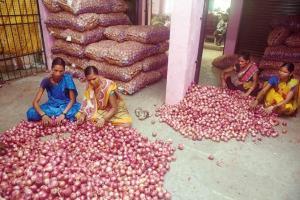What happens in times of the lockdown when the humble onion and potato end up becoming your sole saviours in the kitchen?

This image has been used for representational purposes only
 "Didi, aata fakth batata aani kaanda milnaar. Baghu ya, May 3 nantar kaay honar…." [Sister, only onions and potatoes are available. Let's see what happens post May 3]
"Didi, aata fakth batata aani kaanda milnaar. Baghu ya, May 3 nantar kaay honar…." [Sister, only onions and potatoes are available. Let's see what happens post May 3]
With those words, the veggie vendor in my ilaaka sounded the near-death knell to all heady culinary pursuits I had imagined indulging in, as part of a much-needed Sunday distraction, and egged on by the fun recipes that we've been featuring in The Guide. Turns out my neighbourhood, being on the fringes of a containment zone, was affected by local orders that didn't permit the distribution of most vegetables and fruits.
ADVERTISEMENT
'What now?' I asked myself. This was surely something that I hadn't anticipated, since this new clampdown was a recent development. But being born into an Anglo Indian household, the onion and potato were both familiar friends in the kitchen. I'd happily play designated hand for the cutting and peeling of both veggies at home, to be of use around the kitchen. On any given day, Sundays or even a festival or family celebration, these two heavyweights made their presence felt in more than one main dish at the table.
Anglo-Indian cuisine
Country captain chicken, Devil fry, Potato croquettes, Beef buffath, Masala pork chops, Fritharth... the list is endless really, and so are the memories of those lavish meals had at home or at family gatherings. I recall those glorious summer holidays as carefree kids in particular, when we'd head to my maternal grandparents' home. Theirs was a spacious tiled-roof house with a massive storage room that was a brilliant option during our hide-and-seek soirees. As we would be more than a dozen people to feed during the holidays, my nana [grandmother] would assign tasks to each of the grandchildren – from peeling potatoes [my top and fave chore] to slicing onions, chopping beans or scraping the insides of tender coconuts. Curing or cleaning all the meats and seafood was her domain; if she needed a break, one of her daughters would take over for a bit, but boy, how she would rock the show with her speed and passion with every single ingredient that went into those earthen cooking pots. It was like watching a culinary orchestra come together – from the crackling display of the tadka, and the timing when it came to cooking the beef right to her intuition when she would try a new recipe – for a wide-eyed kid it was like a warm initiation to live cooking sessions. Oh, and yes, I was also the anointed guinea pig for tasting each dish at different critical stages of the preparation [not that I complained at any point]. For my mother, it was a relief that I was occupied here, rather than be up to some mischief with the rest of the bachcha log, like fall off the branch of a tree, bruise a knee in a game of seven tiles, pester the neighbour's cats…you get the drift, right?
Potato love
Coming back to the endless love affair with potatoes and onions, my wise papa [grandfather] would regale us with stories of how both ingredients, like many of the spices, became part of Indian, and our cuisine too, after the Portuguese invaded our shores. For the uninitiated, the Portuguese connect with Anglo Indians goes back to the origins of the latter's roots and their ancestry, and so he would take great pains to explain fascinating anecdotes about how our food and prep techniques, as well as customs had elements and traces that were borrowed from that tiny European country. And somehow, the potato or the onion found its way into many stories, either as a central character, or a key parallel element to the plot.
Many years later, as history emerged a favourite subject, I discovered its significance in history too, where during World War II, how Navy men from USS O'Bannon's used potatoes to trick the Japanese into believing they were grenades, or about a bunch of families from Germany known as Potato Germans who cultivated the vegetable in Jutland in the mid 1700s.
To what extent these two vegetables end up being my saviours during the lockdown, will have to be seen but I for sure have enough of history to dip into each time I am found wanting for inspiration and resilience when I enter the kitchen.
mid-day's Features Editor Fiona Fernandez relishes the city's sights, sounds, smells and stones...wherever the ink and the inclination takes her. She tweets @bombayana
Send your feedback to mailbag@mid-day.com
Catch up on all the latest Mumbai news, crime news, current affairs, and a complete guide from food to things to do and events across Mumbai. Also download the new mid-day Android and iOS apps to get latest updates.
Mid-Day is now on Telegram. Click here to join our channel (@middayinfomedialtd) and stay updated with the latest news
 Subscribe today by clicking the link and stay updated with the latest news!" Click here!
Subscribe today by clicking the link and stay updated with the latest news!" Click here!







